Your Phone Is Silently Sabotaging Your Workday
Smartphones are wrecking workdays. Employees check their phones an average of 58 times daily. That distraction leads to a loss of 1.76 hours a week. Who’s surprised? Focus drops by 20% when phones are in the mix. Almost 80% of people admit they can’t function without their devices. It’s a bizarre dependency. Plus, constant notifications silently ruin productivity. But hey, there’s more to this story. Keep going to uncover the real impact of your little pocket distraction.

In a world where it seems like everyone is glued to their smartphones, the office might just be the worst place for it. Imagine this: employees checking their phones 58 times a day, with a third of those checks happening right in the middle of work. It’s like a game of distraction roulette, except nobody wins. Instead, productivity takes a nosedive. Data shows that smartphone addiction is not just a buzzword; it’s a reality with a moderate correlation to decreased productivity. Employees are losing an average of 1.76 hours a week due to incessant phone interruptions. That’s almost two hours of valuable time, wasted.
And get this: when employees can use their phones freely, focus drops by a staggering 20%. It’s no wonder that 55% of managers directly blame smartphones for lower productivity levels. With personal messaging being the top distraction for over half of the workforce, it’s clear that the workday is a battlefield—one where smartphones are winning. Interestingly, 30% of companies report faster customer service responses due to mobile access, but this comes at the cost of employee concentration. Using moderators to manage comments and establish community guidelines can also help improve focus. In fact, engaging topics can significantly enhance viewer retention, just as structured work environments can boost employee productivity.
Some companies have caught on, implementing cellphone policies to curb this madness. Almost 75% of workplaces have established rules to boost focus. But here’s the kicker: 80% of employees admit they struggle to be effective without their phones. It’s a double-edged sword. You need your phone for quick communication and efficiency—83% of employees agree on that—but it’s also a massive source of distraction. Interestingly, research indicates that hiding phones does not eliminate procrastination; instead, it often leads to increased time spent on computer screens.
Then there are those “phone-free zones.” Apparently, they work wonders. Employees in those areas report improved concentration. Who would’ve thought? Companies that set clear smartphone guidelines see a boost in satisfaction and work-life balance.
Yet the irony remains. People crave those little devices for mental breaks, falling into compulsive usage patterns. It’s a wild cycle of distraction and dependency. And in the end, smartphones are silently sabotaging the workday, one notification at a time.
Frequently Asked Questions
How Can I Reduce Distractions From My Phone During Work Hours?
To cut phone distractions at work, employees can take a few simple steps.
First, turn off those pesky notifications. Seriously, who needs to know about every like?
Next, try phone-free work sessions. Get that thing out of reach!
Focus apps? Yeah, they actually work.
And let’s not forget “no-phone” zones. It’s not rocket science.
Reducing phone use can boost productivity—because let’s face it, scrolling isn’t going to get that report done.
What Apps Are Most Effective for Productivity and Focus?
When it comes to productivity apps, some stand out like a sore thumb.
Todoist is great for organizing chaos, while RescueTime stalks your usage habits—creepy, but useful.
Beeminder throws in some gamification, making goals feel like a game.
Then there’s Forest, turning focus into a fun little challenge.
Notion? It’s basically a Swiss Army knife for organization.
So, pick your poison, but remember—it won’t fix your procrastination problems.
That’s on you.
Are There Specific Settings to Minimize Notifications?
To minimize notifications, users can explore their device settings.
It’s not rocket science. Just find the notifications menu. Block or allow specific apps. Easy.
Want visual alerts without annoying sounds? You got it. Group apps for neatness.
And that lock screen? Customize it to hide sensitive content or just display what matters.
It’s all about reducing distractions. Because, let’s face it, constant pings are about as welcome as a mosquito at a picnic.
How Often Should I Take Breaks From My Phone?
How often should one take breaks from their phone? Well, a good rule of thumb is every 20-30 minutes.
Yeah, that’s right, just enough time to scroll through memes. Research shows short breaks can actually boost productivity.
But here’s the kicker: if you don’t regulate phone use, you could lose up to two hours daily.
So, set some boundaries—your brain (and your boss) will thank you.
Seriously, don’t let that tiny screen run your life!
Can Using My Phone Improve My Work-Life Balance?
Using a phone can help or hurt work-life balance. It’s a double-edged sword.
Sure, you can work from your couch, but that pesky FOMO creeps in. Notifications buzz, and suddenly it’s 10 PM, and you’re still “on.” Boundaries? What boundaries? The constant pinging can lead to burnout and stress.
But, if used wisely, phones can offer flexibility. Just don’t let them run your life. Balance is key, and that’s easier said than done.

